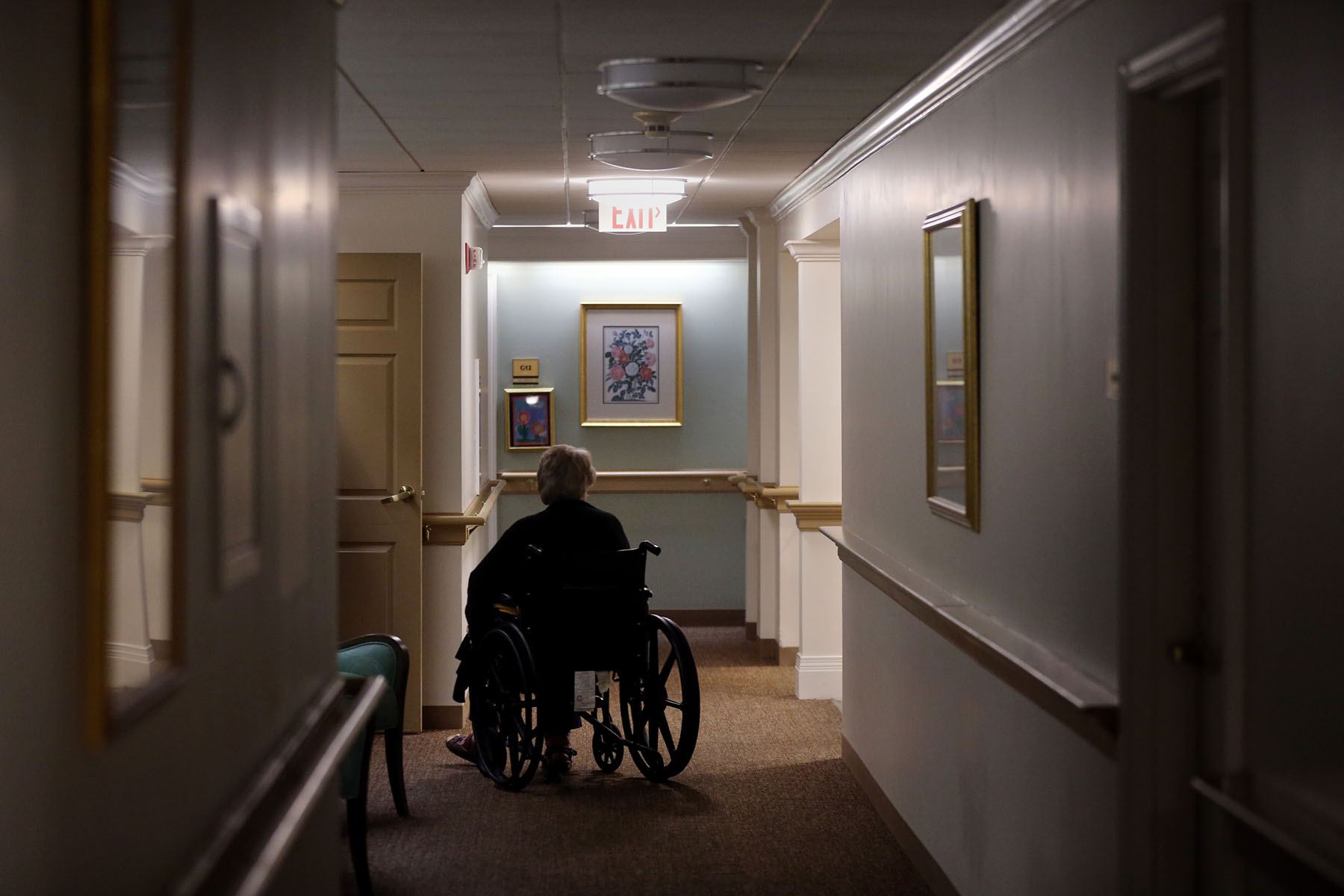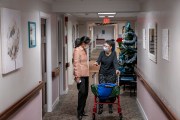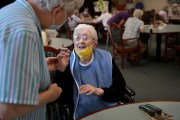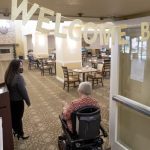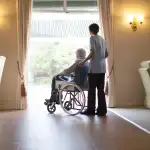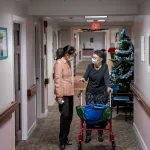Your trusted source for contextualizing caregiving news. Sign up for our daily newsletter.
If you are no longer able to care for yourself in the future, how comfortable would you be living in a nursing home? About 7 in 10 adults say they would be somewhat or very uncomfortable, and more women than men cited personal safety as a major concern, according to a recent poll from Gallup and West Health. Overall, Americans give nursing homes an average D+ grade for quality of care.
Tim Lash, the president of West Health, a nonprofit medical research organization that conducted the survey alongside Gallup, said he was shocked by the findings.
“We anticipated concerns around costs, but the concerns around quality and safety were particularly shocking,” Lash said. “At a system level people often say U.S. healthcare could be done better, but people tend to feel pretty good about individual instances with their doctor or hospital. To have so many say they were concerned about quality of care, and women citing safety concerns — that was a little frightening and much higher than we thought it was going to be.”
The survey was conducted over the course of three weeks in July via a nationally representative sample of adults, including those who might not have any personal connection to nursing homes. It was released just after the Biden administration released the first-ever nursing home staffing requirements, the most significant change to regulations since they were first created 50 years ago. Still, the survey found that American adults are most concerned with the quality of care, cost and potential emotional and mental toll of aging in nursing homes. About 1 in 3 women said they would be worried about their physical safety at a nursing home, while men were more likely to say they were worried about losing their independence.
-
Read Next:
Linda Edelman, a professor at University of Utah’s College of Nursing, said that it makes sense that women are more concerned about safety given that most of the more public cases of egregious physical and sexual violence in nursing homes have been against women.
“Women in general are more concerned about safety, and I think that’s a lifelong concern,” said Edelman, who is also the director of the Hartford Center of Geriatric Nursing Excellence. “That carries on into a setting where they are at their most vulnerable time in their lives and physically frail.”
Concerns around aging in the United States is an inherently gendered issue: Women make up more than two-thirds of the nursing home population, and about 90 percent of nursing home aides are women. The majority of family caregivers in the home are women. And demand for care is likely to grow as the 85-plus demographic, which is also overwhelmingly women, is expected to more than triple by 2050.
Lash said the COVID-19 pandemic negatively impacted the public’s perception of nursing homes, which were seen as “ground zero” in many ways. More than 186,000 nursing home residents and staff died in the first couple years, pushing the industry into a financial crisis. But polls like this are critical in understanding public concern and informing policy making moving forward, he added.
Katie Smith Sloan, the president and chief executive of LeadingAge — an association of thousands of nonprofit providers of aging services, including nursing homes — attributed the public’s negative perception of nursing homes to misrepresentations from the news and officials.
“Nursing homes have been portrayed as the villain by media and policymakers,” Sloan said in a statement. “So it’s no wonder that everyday Americans may be skeptical or fearful of nursing homes. We know that attitudes about nursing homes are shaped by fear of getting older and societal ageism that devalues older lives.”
Sloan also pointed to outdated funding models and underinvestment in the nursing home infrastructure that has led to a widespread undervaluing of nursing homes. The research supporting these concerns is mixed; one study found that perception was affected by family involvement, not necessarily representative of the quality of care. Another, however, found that from 2013 to 2017, 82 percent of all inspected nursing homes insufficiently prevented infections, in some cases lacking regular handwashing.
“It’s time for that demonization to end because nursing homes are an important part of our healthcare system,” Sloan said. “We’ll always need residential care for people who cannot remain in their own home for whatever reason.”
-
Read Next:
Edelman said that there’s always been stigma around nursing homes and the kind of care they give, but the “crux of the problem” is that they are not well compensated for the care that they give.
“It takes tremendous costs to provide 24/7 nursing care and all of the other services — from dietary staff to facilities and maintenance fees to occupational therapists and activity directors and other administrative personnel,” Edelman said. “It’s a very expensive type of care that’s provided in a setting that’s supposed to look like a home.”
In addition, people tend to have more negative perceptions because nursing homes are wrapped up in the emotional end-of-life discussions and decisions that are often painful for families, Edelman added.
“A lot of times, we wait until an absolute crisis before we even think about what nursing home care would look like, and then people make a fast decision,” Edelman said. “They haven’t been able to really investigate and advocate for the person that is going to be needing that kind of care. There’s this juxtaposition between recognizing that their loved ones need this high level of care, but then never feeling like that care is good enough.”
Angela Mattie, a professor in both Quinnipiac University’s Schools of Business and Medicine, said the staffing shortage in the healthcare industry is “one of the most significant public health problems we’re facing,” and it’s even more exacerbated in nursing homes as more people age and people live longer.
“The nursing home industry, like the rest of the health care industry, is struggling with work shortage issues that are significant right now,” said Mattie, who also served as a Health and Aging Policy Fellow in Rep. Rosa DeLauro’s office in 2019 and 2020. “That has a domino effect on the quality of care of the services that can be provided. You have more people needing and wanting services, and then you have less caregivers available to take care of the growing demographic.”
In addition, Mattie said our society does not have the same reverence for the elderly that other countries do. Many households rely on two incomes, which also means no one is home to care for the elderly, and there is not enough financial incentive to make that possible.
“It’s not an issue that people want to address,” Mattie said. “We need to begin to talk about these issues. We’re all going to get old, and we’re all going to die. And that’s the reality. We’re going to go into this cohort in a much larger group than our parents, so we need to get young people involved in wanting to care.”
Mattie said the answer is not going to be easy, but people need to start thinking about more nontraditional methods to deliver care for this increasing population.
“Who wants to be in a nursing home?” Mattie said. “Is it fair? People live long, productive lives. Can’t we find a way to keep them in the community?”
Lash, the head of West Health, agreed and said that he hopes the Biden administration and other policymakers start to think “more holistically” about how people can age in this country — with less of a focus on nursing homes as the only option.
“We have to start thinking about solutions differently, and we have to start really measuring what we’re looking to change,” Lash said. “That’s particularly true when we think about the experiences of men versus women and the LGBTQ+ population versus others. You have to start thinking: ‘How are we addressing the unique aspects of a diverse population?’”
Lash said he’s already seen programs and models of care around the country that help keep the elderly in their homes. There are geriatric emergency departments that perform preventive assessments, identify risks and provide home supports that can minimize falls. There are other programs that fund temporary nursing home-level care within homes to help support families during shorter recovery periods. There are funding models that can better incentivize family caregivers.
“Most people want to be home, right?” Lash said. “They want to be in their community if that’s a possibility. As we think about longer term care, we should break down the siloes of how we think about things. Deployment of dollars within the state and federal government should be put towards interventions that can lower the need for nursing homes in the first place.”
